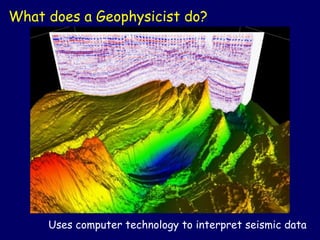All Categories
Featured
Table of Contents
Geophysicist, Exploration - Job Descriptions in Melville Oz 2020
This work is progressively contracted out, so consultancies provide another source of work. Consultancy firms vary in size, from extremely little business to large multinationals. Some consultancies are quite specialised in using particular geophysical methods or working in particular places, while others provide a more varied range of services to their customers.
The extraction of gas from landfill sites is another area of employment and this may grow in the future. Expedition companies might undertake work for construction firms, water companies, mining business and environmental firms, so geophysicists might be employed in any of these settings. Other companies include: geological surveysgovernment bodies and agenciesuniversities and research study institutes.


Vacancies may be noted in the oil and gas sector press. Recruitment is affected by oil price fluctuations and the level of competition for positions differs depending upon this. Professions Days, which cover the full range of geoscience careers and are usually gone to by a variety of key industry companies, are run by The Geological Society.
Geophysical Surveys - Method Types And Work Tehniques I ... in Stirling Australia 2023
Some of the large oil and gas companies offer a full two-year structured training programme throughout the breadth of geophysics, consisting of the chance to experience operate in different teams before specialising in one area. Your training may include deal with: existing wellsmagnetic and gravitational prospective field information analysisresearchrock analysis. However, it's more typical for your initial training to be provided on the task.

There might be a probationary period during which you work along with an experienced colleague. Competency-based appraisals take location regularly in most firms. In smaller companies, and for academic posts, there is unlikely to be any official training - you'll be expected to start work straightaway and select up abilities as you go along.
If you work for a smaller company, you might find that you need to take obligation for organizing and funding your own advancement and training. If you have a geology degree, membership of The Geological Society can be beneficial for networking and for maintaining to date with the market.
Geophysical Survey - Durham University in Cottesloe Australia 2022
You may likewise find it beneficial to join the PESGB (The Petroleum Exploration Society of Great Britain, which has a geophysics unique interest group. After a probationary period, and once you have actually acquired some experience, you might progress to senior geophysicist, then team leader and after that into a senior role in management.
The ease of movement between functions depends on the business structure. Research study at Masters or Ph, D level in a subject associated to geophysics or geosciences might aid with your profession advancement and development. The employment market within the oil and gas market is very depending on cost and this might impact your opportunities for career progression.
For knowledgeable geophysicists, freelance consultancy uses a great path for profession advancement. As a geophysicist, you're most likely to have several tasks throughout your working life.
How A Geophysical Survey Is Crucial To Offshore Wind Farm ... in Darch Australia 2023
From geophysics, it's possible to focus on seismology (completing additional training to end up being a seismic interpreter) or to move into associated areas such as engineering geology or hazard forecast.
Deciding what to study in college is a tough choice. Even if you understand that your field of interest depends on science, what program of study is best for you? If you make the choice to major in physical and biological sciences and pursue a profession as a geophysicist, you're preparing for an exciting and successful profession.
The first step to achieving your objective of becoming a geophysicist is making a degree. Even for entry-level positions in the field of geoscience, you'll need a bachelor's degree (a geophysicist college degree) from a recognized college or university. Geophysicists need to be able to: analyze rocks, photos, and other pieces of information carry out research study both in the field and in labs produce maps and charts of their findings compose reports To achieve all this, students need a specialized education for geophysicist careers.
As mentioned above, you'll require a bachelor's degree in geoscience or a related discipline, such as a physical science or a natural science, to land an entry-level job. Trainees can likewise prepare by majoring in topics like: Biology Chemistry Computer system science Engineering Mathematics Physics The above geophysicist majors offer a more generalized technique to a single clinical discipline, but a lot of programs need students to take one or more geology course.
Latest Posts
What Is Geophysics And What Do Geophysicists Do? in Sinagra Australia 2023
Geophysics in Beckenham Western Australia 2022
Geophysical Survey - An Overview in West Perth Oz 2020